AI agents are rapidly becoming a cornerstone of technological innovation, transforming industries and daily life alike. These intelligent systems, capable of perceiving their environment, making decisions, and taking actions autonomously, are driving efficiencies and advancements across sectors such as healthcare, finance, and manufacturing. With their ability to process vast amounts of data and learn from experiences, AI agents are revolutionizing everything from customer service to autonomous transportation. As these systems evolve, their influence will only continue to grow, shaping the future of work, decision-making, and how we interact with the world around us.
Let us explore how AI Agents are shaping the future of technology:

What Are AI Agents?
AI agents are intelligent software entities that perceive their environment, analyze data, make decisions, and take actions autonomously to achieve specific goals. These agents function using sensors for data collection, decision-making algorithms, and actuators to execute tasks. Depending on their complexity, AI agents can be simple rule-based systems or advanced learning-based models capable of adapting over time.
Why Are They Important?
AI agents play a crucial role in enhancing automation, efficiency, and decision-making across various industries. In healthcare, they assist in diagnosing diseases, personalizing treatments, and managing patient care. The finance sector benefits from AI agents in fraud detection, risk analysis, and automated trading. Smart homes leverage AI-driven virtual assistants to control devices, manage schedules, and improve security. By streamlining processes and reducing human intervention, AI agents contribute to increased productivity and innovation.
Examples of AI Agents
AI agents are widely used in real-world applications. Smart assistants like Siri and Alexa use natural language processing to interact with users and perform tasks. Autonomous robots in industries such as manufacturing and logistics optimize operations and reduce errors. AI-powered customer support systems provide instant responses, improving user experience and efficiency. As AI technology advances, AI agents will continue to revolutionize various sectors, making everyday tasks smarter and more efficient.
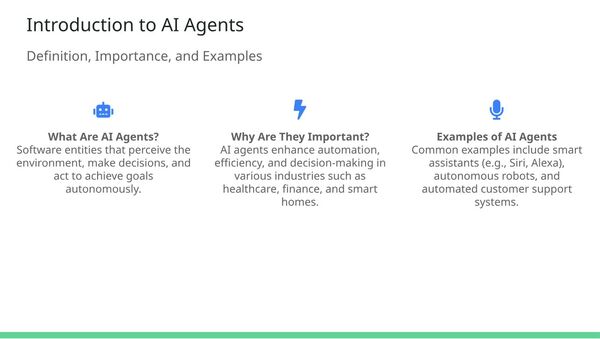
Components of an AI Agent:
AI agents function through several key components that enable them to perceive, analyze, act, and learn from their environment. These elements work together to ensure seamless automation and intelligent decision-making.
• Perception (Sensors): AI agents collect data from their environment using sensors such as cameras, microphones, and IoT devices. These sensors enable the agent to interpret real-world inputs, such as visual data, sound, or environmental conditions, forming the basis for decision-making.
• Decision-Making (Algorithms): AI agents utilize AI algorithms like machine learning and rule-based systems to analyze data and determine actions. Depending on the complexity of the task, decision-making can range from simple predefined rules to advanced deep learning models that adapt over time.
• Action Execution (Actuators): Physical or digital actuators perform actions based on AI decisions, such as robotic arms or software commands. In robotics, actuators enable movement and manipulation, while in digital systems, they trigger automated processes like sending notifications or executing transactions.
• Learning (Adaptation): AI agents improve their performance through feedback loops and self-learning mechanisms. By continuously analyzing past actions and refining their strategies, they enhance their accuracy, efficiency, and adaptability over time.
These components collectively empower AI agents to operate effectively across industries, driving automation and innovation.
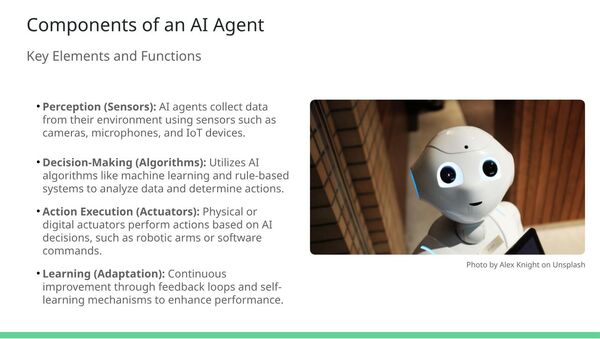
Types of AI Agents:
AI agents are classified into different categories based on their decision-making processes and adaptability. Each type serves a unique purpose and operates with varying levels of complexity.
• Simple Reflex Agents: React to specific inputs based on predefined rules. These agents do not store past experiences or consider future consequences. Examples include thermostats that regulate temperature based on sensor readings and rule-based chatbots that respond to keywords without context awareness.
• Model-Based Reflex Agents: Utilize internal models of the environment to make informed decisions. Unlike simple reflex agents, they maintain a representation of the world, allowing them to handle more complex tasks. Self-driving cars, for example, use model-based reflex agents to interpret road conditions and navigate safely.
• Goal-Based Agents: Act to achieve specific objectives using search and planning mechanisms. These agents evaluate different possible actions to determine the best path toward a goal. Route planning systems, such as GPS navigation, use goal-based agents to provide optimal travel routes.
• Utility-Based Agents: Optimize decisions to maximize utility by evaluating different possible actions based on a utility function. Financial advisory systems, for instance, analyze market trends and customer preferences to suggest investment strategies.
• Learning Agents: Improve performance over time using experience. These agents adapt through machine learning techniques, continuously refining their decision-making processes. Recommendation engines, such as those used in e-commerce and streaming platforms, learn user preferences to suggest relevant content.
These AI agent types collectively enable intelligent automation across industries, enhancing efficiency and decision-making.
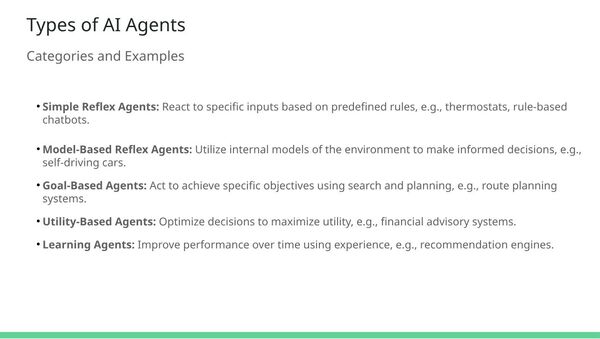
How AI Agents Work:
AI agents operate through a series of interconnected processes that allow them to perceive their environment, make decisions, take actions, and improve over time. These steps ensure that AI agents function efficiently across various applications.
• Sensing the Environment: AI agents gather data through sensors such as cameras, microphones, and IoT devices. These inputs enable them to interpret surroundings, whether detecting obstacles in self-driving cars, recognizing speech in virtual assistants, or monitoring temperature in smart home systems.
• Processing and Decision-Making: Data is analyzed using algorithms and models to derive actionable insights. AI agents employ techniques like rule-based logic, machine learning, or deep learning to process information and determine the best course of action. For example, fraud detection systems analyze transaction patterns to identify suspicious activities.
• Taking Actions: Based on decisions, AI agents interact with their environment via actuators or software. In robotics, actuators enable physical movements, while digital AI agents execute actions like automating tasks, sending alerts, or making recommendations.
• Learning and Improvement: AI systems adapt and refine their responses through continuous learning and feedback. By analyzing past interactions, AI agents improve accuracy and efficiency, ensuring better decision-making over time, as seen in recommendation engines or predictive analytics tools.
Through these steps, AI agents enhance automation, efficiency, and intelligence across industries.
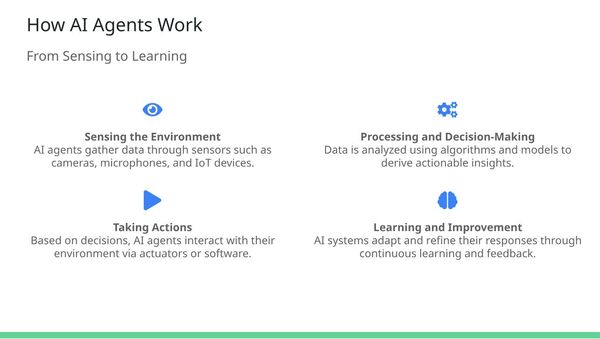
Tools and Technologies Used for AI Agents:
AI agent development relies on a range of programming languages, frameworks, and tools to build scalable and efficient models. These technologies provide the foundation for creating intelligent systems that can operate autonomously across various industries.
Programming Languages: Popular languages for AI agents include Python, R, and JavaScript. Python is widely used due to its simplicity and the vast array of libraries and frameworks available for AI development. R is favored in statistical computing and data analysis, while JavaScript is commonly used for developing AI-powered web applications thanks to its versatility and rich ecosystem.
Machine Learning Frameworks: Frameworks like TensorFlow and PyTorch are essential in building machine learning models for AI agents. TensorFlow is known for its scalability and performance, especially in deep learning applications. PyTorch, on the other hand, is praised for its dynamic computation graph and ease of use, making it a preferred choice for research and rapid prototyping.
Development Platforms: Cloud platforms like AWS, Google AI, and Azure provide powerful tools for deploying and scaling AI agents. These platforms offer a range of services, from storage and computing power to AI model deployment and monitoring, making them ideal for building AI-driven solutions.
Data Processing Tools: Tools such as Pandas and Apache Spark are invaluable in handling and analyzing large datasets efficiently. Pandas is widely used for data manipulation and analysis in Python, while Apache Spark provides distributed data processing, enabling faster and more scalable analysis.
These tools and technologies are central to the creation and deployment of intelligent AI systems that are transforming industries worldwide.
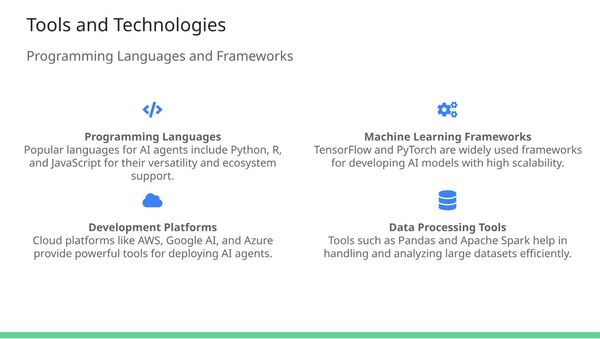
Challenges in AI Agents:
While AI agents offer numerous benefits, their development and deployment come with several challenges that must be addressed to ensure their effectiveness and ethical use.
Data Privacy: Ensuring the protection of sensitive user data against breaches and unauthorized access is a critical concern. AI agents often require access to vast amounts of personal information, making data privacy a top priority. Organizations must implement robust security measures and adhere to privacy regulations to safeguard user data.
Ethical Concerns: Addressing bias, fairness, and accountability in AI decision-making processes is essential to prevent discrimination and ensure equitable outcomes. AI systems must be carefully trained and tested to ensure that their decisions do not perpetuate existing biases or unfair practices.
Real-Time Decision Complexity: Managing the challenge of making accurate and timely decisions in dynamic environments is another hurdle for AI agents. In industries like autonomous vehicles or financial trading, AI agents must process real-time data and make split-second decisions with minimal errors, which can be complex and high-stakes.
Interpretability Challenges: Improving the transparency and explainability of AI model decision-making is crucial for building trust in AI systems. Users and stakeholders need to understand how decisions are made to ensure accountability and correct any potential issues in the models.
Addressing these challenges is key to the responsible and effective use of AI agents across industries.
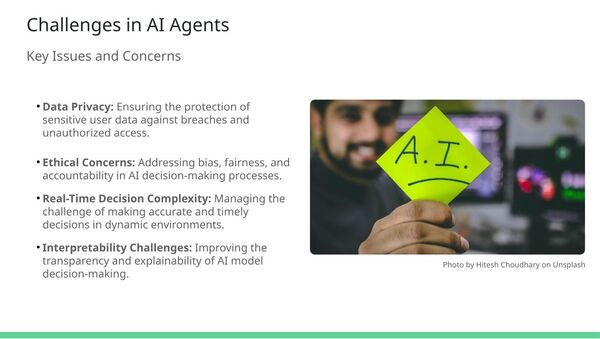
Applications of AI Agents:
AI agents are revolutionizing various industries, enhancing efficiency, accuracy, and user experience. Below are some key real-world applications of AI agents.
Chatbots and Virtual Assistants:
AI agents like Siri, Alexa, and Google Assistant are commonly used to assist users with tasks, answer queries, and automate routine activities. These intelligent systems understand natural language and provide solutions in real-time, making them invaluable tools for daily convenience and customer service.
Healthcare:
AI agents play a critical role in healthcare by assisting in diagnostics, patient monitoring, and personalized treatments. These agents analyze medical data to identify patterns and recommend treatments, enabling doctors to make informed decisions. AI also helps monitor patients remotely, ensuring timely intervention and improving overall healthcare outcomes.
Autonomous Vehicles:
Self-driving cars use AI agents for navigation, obstacle detection, and decision-making. Through sensors and cameras, these agents process real-time data to make crucial decisions about steering, speed, and safety, all while adapting to changing road conditions and ensuring passenger safety.
Finance:
In the finance sector, AI-driven predictive analytics are used for fraud detection, investment decisions, and risk assessment. AI agents analyze vast amounts of financial data, identifying patterns that human analysts might miss, which helps in making more informed and accurate financial decisions.
Customer Service:
Virtual AI assistants and chatbots are now essential in customer service, providing instant responses, resolving issues, and enhancing user experience. AI agents can handle multiple inquiries simultaneously, reducing wait times and improving efficiency.
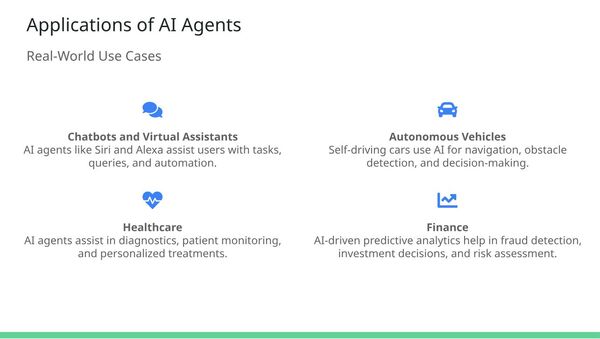
Retail and E-Commerce:
AI agents personalize shopping experiences by recommending products based on user preferences and past behavior. They optimize inventory management and streamline supply chain logistics, ensuring efficient operations.
Manufacturing:
In manufacturing, AI agents enhance automation through predictive maintenance, quality control, and workflow optimization. Smart robots powered by AI agents improve production efficiency and minimize human error.
Transportation:
Autonomous vehicles and AI-driven traffic management systems leverage AI agents to improve safety and efficiency. These agents analyze real-time traffic data, optimize routes, and assist in self-driving car operations.
Education:
AI-powered tutors and personalized learning systems adapt to student needs, making education more effective. AI agents analyze learning patterns, suggest customized study plans, and provide real-time feedback.
Cybersecurity:
AI agents strengthen cybersecurity by detecting threats, preventing cyberattacks, and automating security responses. They analyze network activity to identify suspicious patterns and protect sensitive data.
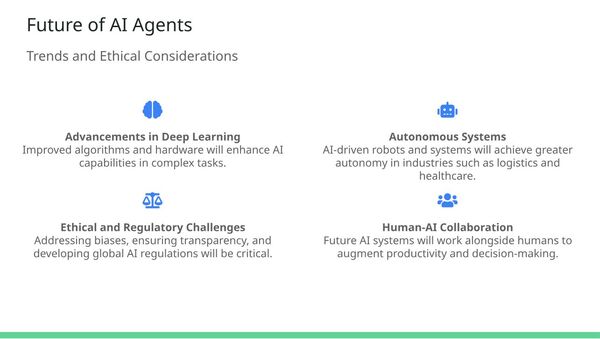
Future of AI Agents:
The future of AI agents holds exciting advancements, but it also raises important ethical considerations. As technology evolves, AI systems will become more powerful and integrated into our daily lives.
Advancements in Deep Learning:
Improved algorithms and hardware will significantly enhance AI capabilities in handling complex tasks. Deep learning models will continue to evolve, enabling AI agents to process larger datasets and perform tasks with higher precision, opening up new possibilities in areas like natural language processing, computer vision, and robotics.
Ethical and Regulatory Challenges:
As AI technology advances, addressing biases, ensuring transparency, and developing global AI regulations will be critical. Governments and organizations must collaborate to create ethical frameworks that ensure fairness, accountability, and privacy in AI decision-making processes. Balancing innovation with ethical responsibility will be essential to maintaining public trust in AI systems.
Autonomous Systems:
AI-driven robots and systems will achieve greater autonomy in industries such as logistics and healthcare. These autonomous agents will be capable of performing tasks like supply chain management and surgery with minimal human intervention, improving efficiency and reducing the risk of errors.
Human-AI Collaboration:
Future AI systems will work alongside humans to augment productivity and decision-making. Rather than replacing human workers, AI will enhance their abilities, enabling better outcomes in areas like research, business strategy, and customer service.
These trends demonstrate the transformative potential of AI agents, along with the need for responsible development and oversight.
Conclusion
Summary of Key Concepts:
AI agents are intelligent systems designed to perceive their environment, make decisions, take actions, and continuously learn to enhance automation and efficiency. By leveraging sensors, algorithms, and feedback loops, these agents operate autonomously to perform tasks and improve over time, contributing to advancements across multiple sectors.
Importance of AI Agents:
AI agents are transforming industries such as healthcare, finance, and automation. In healthcare, they assist with diagnostics and personalized treatments. In finance, they enable predictive analytics for fraud detection and investment decisions. In automation, AI agents are driving efficiency in industries like logistics and manufacturing. Their ability to make data-driven decisions and operate autonomously makes them invaluable tools in optimizing processes and creating new possibilities.
Encouragement for Further Learning:
The field of AI is evolving rapidly, and there’s much more to explore. As AI technologies advance, so do the tools, frameworks, and ethical considerations that come with them. Whether you’re interested in deep learning, machine learning frameworks, or the ethical implications of AI, continuous learning will ensure you remain ahead in this transformative field. Exploring these areas further will prepare you for future AI developments and their broader impact on society.
AI agents are just the beginning of a new era in technology.




